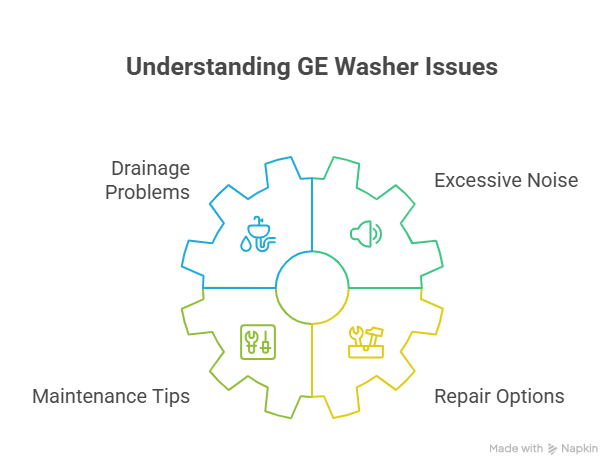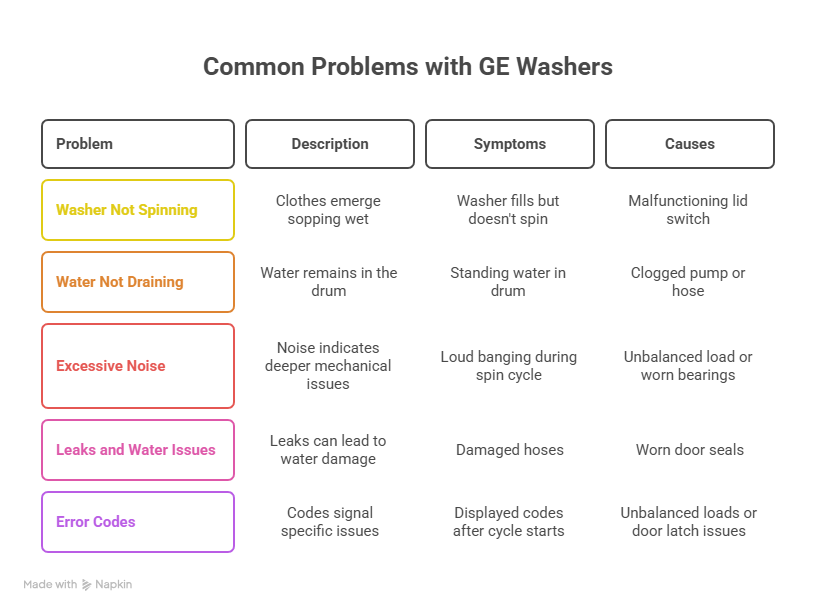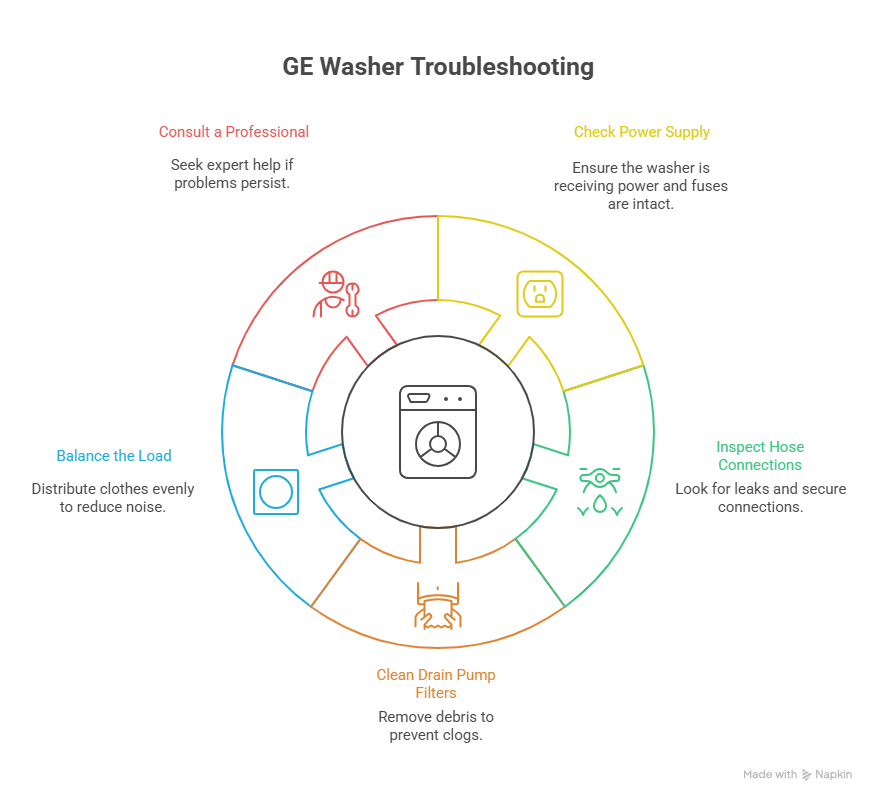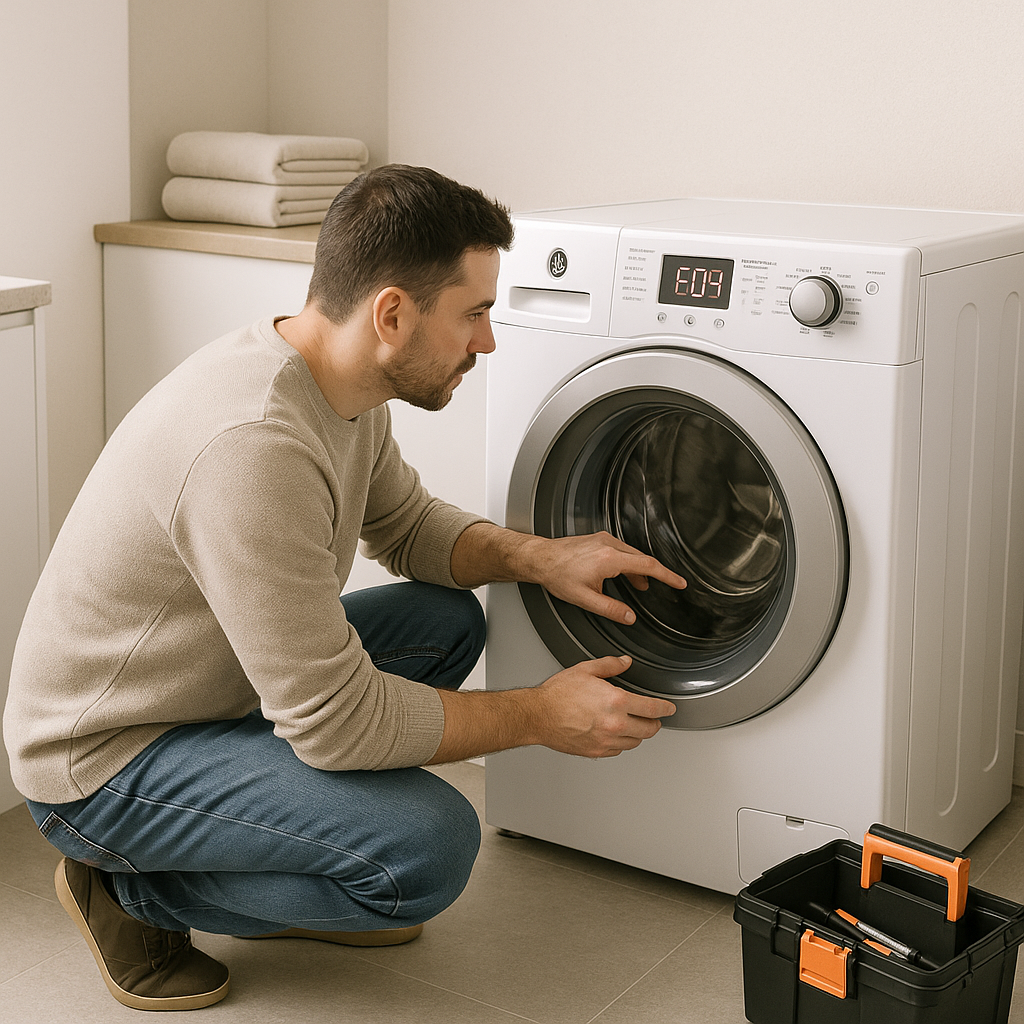General Electric washers are popular for their reliability and performance. However, like any appliance, they can face issues over time. Understanding these common problems can help you maintain your washer effectively.
From drainage issues to excessive noise, GE washers can encounter various challenges. Knowing when to troubleshoot or call for professional repair is crucial.
This guide will explore common issues with General Electric washers. It will also provide tips on maintenance and repair options.
Whether you’re a current owner or considering a purchase, this information will be valuable. Let’s dive into the details.

Overview of General Electric Washers
General Electric washers are known for their advanced technology and user-friendly design. They offer a wide range of models to suit different needs and preferences.
Key features include:
- Efficient water usage
- Various cycle options
- Robust build quality
These washers combine innovation and durability, making them a popular choice in households. With proper care, they can provide years of reliable service. Understanding their features helps in troubleshooting and maintenance.
Front Load vs Top Load Washers: Key Differences and Which Is Best
Most Common Problems with GE Washers
Despite their reputation for reliability, General Electric washers can face common issues. Recognizing these issues early can minimize hassle and repair costs.
Some prevalent problems include:
- Washer not spinning
- Water not draining
- Excessive noise
- Leaks and water issues
- Error codes on display
Each issue can stem from specific causes. For example, a washer that won’t spin might have a faulty lid switch. Water drainage issues often result from clogged hoses. Noise might indicate worn bearings. Error codes usually point to electronic failures, needing careful diagnosis. Understanding these issues aids in determining when to repair or call for GE service. Regular maintenance further reduces these problems, extending your washer’s lifespan.
Washer Not Spinning or Agitating
When a washer doesn’t spin, clothes emerge sopping wet. This can frustrate users expecting efficiency. Common causes include a malfunctioning lid switch or a broken motor coupling.
Symptoms to watch for:
- Washer fills but doesn’t spin
- Quiet hum with no movement
- Incomplete cycles
Checking these elements can help identify the issue. Addressing the problem may require part replacement, or in some cases, professional repair. Diagnosing early saves on costly repairs later.
Washing Machine Not Spinning: Common Issues and Fixes
Water Not Draining Properly
If water remains in the drum after cycles, it can lead to unpleasant odors and mildew. A clogged pump or hose often causes this issue.
Key signs of drainage problems:
- Standing water in drum
- Prolonged cycle duration
- Musty smell
Cleaning the drain pump filter often resolves the issue. Examine hoses for kinks or obstructions, ensuring they aren’t blocked. Regular inspection can prevent this common problem from recurring.
Excessive Noise and Vibration
Noise is more than just a nuisance; it can indicate deeper mechanical issues. An unbalanced load or worn bearings usually causes these disturbances.
Look out for:
- Loud banging during spin cycle
- Vibrations shaking the machine
- Rhythmic, droning noises
Redistributing the load might solve the immediate issue. Persistent noise, however, may require checking bearings or suspension springs. Consistent noise warrants a call to a general electric washer repair service.
Leaks and Water Issues
Leaks can lead to significant water damage in a home. Identifying the source quickly is crucial to prevent further problems.
Common sources of leaks include:
- Damaged hoses
- Worn door seals
- Faulty water inlet valves
Inspecting these areas regularly can catch problems early. Tightening or replacing parts often resolves leaks effectively. If the leak persists, professional service may be needed to prevent extensive damage.
Error Codes and Electronic Failures
Error codes on GE washers signal specific issues, helping guide repairs. Common codes reflect problems like unbalanced loads or door latch issues.
Pay attention to:
- Displayed codes after cycle starts
- Repeated errors despite resets
- Non-responsive controls
Understanding these codes aids in troubleshooting. If codes persist, it might indicate a need for electronic board repair or replacement. GE’s resources can guide decoding these errors, or seek help from GE service repair professionals.

DIY Troubleshooting Tips for GE Washers
Tackling minor issues with your washer can save both time and money. A few easy troubleshooting tips can resolve many common problems efficiently.
When facing washer issues, try these steps:
- Check power supply and fuses
- Inspect hose connections for leaks
- Clean out drain pump filters
- Balance the load to reduce noise
These simple checks can often fix the problem without needing GE washer repair services. However, if issues persist or worsen, consulting with a professional is recommended. Empowering yourself with these tips can enhance your washer’s performance and lifespan.

When to Call a Professional for GE Washer Repair
Sometimes, washer issues require more than a simple fix. Recognizing when professional intervention is essential can prevent further damage.
Consider calling a GE service repair expert if:
- You’ve tried troubleshooting without success
- You notice electrical issues
- Leaks persist despite efforts
Professional help ensures safe, effective resolutions, prolonging your washer’s useful life. Don’t hesitate to seek expert advice when needed.
GE Service, Warranty, and Support Options
General Electric offers comprehensive support for appliance repairs and maintenance. Their service network ensures you get help when you need it.
Explore GE’s support options, including:
- General electric warranty service
- GE Cares customer support
- Local service centers
Utilizing these resources can save you time and stress. GE’s commitment to customer satisfaction reflects in their range of support services. Stay informed about your warranty and available services to ensure prompt assistance.
Preventive Maintenance for Long-Lasting Performance
Routine care extends your GE washer’s lifespan. Regular checks prevent costly repairs.
Consider these maintenance tips:
- Inspect and clean filters regularly
- Balance loads to minimize wear
- Use correct detergent amounts
Following these simple steps ensures efficient washer operation. With consistent maintenance, enjoy long-lasting performance from your appliance.
Conclusion: Keeping Your GE Washer Running Smoothly
Understanding common issues helps in maintaining your GE washer effectively. Regular maintenance checks prevent many potential problems. When issues arise, quick action is crucial to avoid more significant damage. Professional repair services offer reliable solutions when necessary. Proper care and timely repairs ensure your washer operates at its best for years to come.





